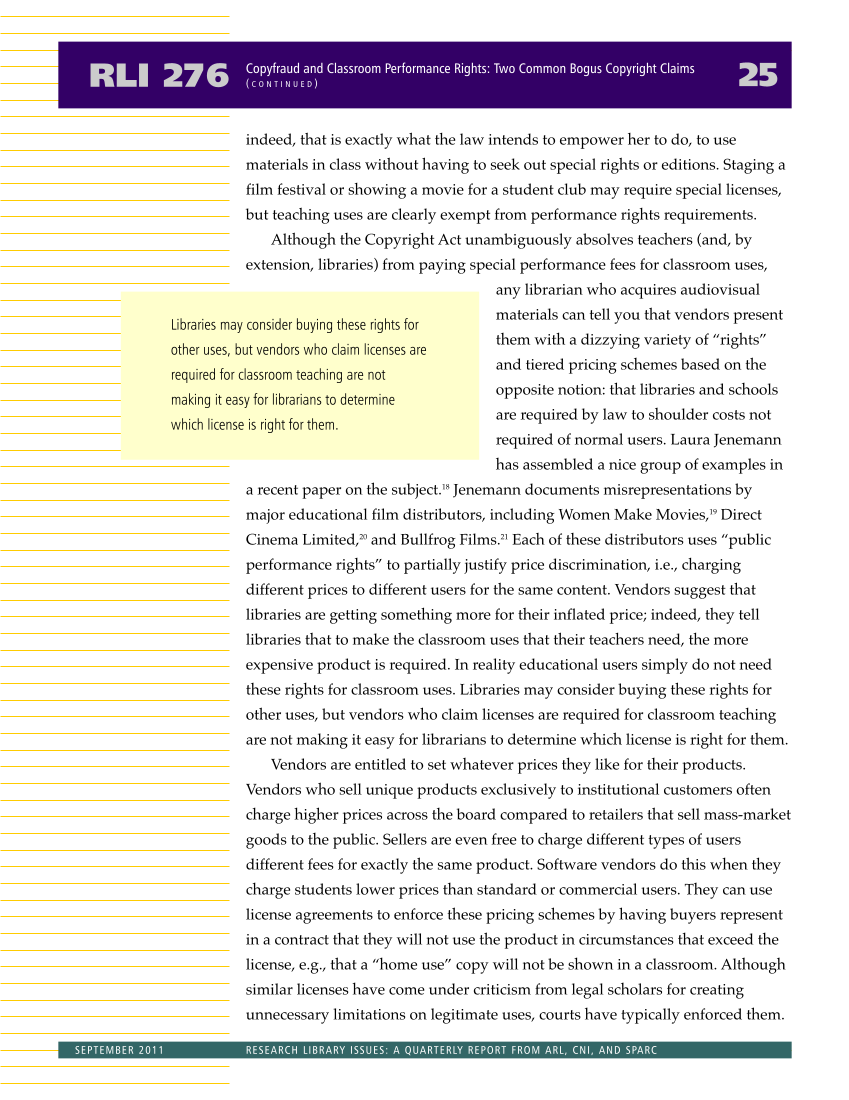indeed, that is exactly what the law intends to empower her to do, to use materials in class without having to seek out special rights or editions. Staging a film festival or showing a movie for a student club may require special licenses, but teaching uses are clearly exempt from performance rights requirements. Although the Copyright Act unambiguously absolves teachers (and, by extension, libraries) from paying special performance fees for classroom uses, any librarian who acquires audiovisual materials can tell you that vendors present them with a dizzying variety of “rights” and tiered pricing schemes based on the opposite notion: that libraries and schools are required by law to shoulder costs not required of normal users. Laura Jenemann has assembled a nice group of examples in a recent paper on the subject.18 Jenemann documents misrepresentations by major educational film distributors, including Women Make Movies,19 Direct Cinema Limited,20 and Bullfrog Films.21 Each of these distributors uses “public performance rights” to partially justify price discrimination, i.e., charging different prices to different users for the same content. Vendors suggest that libraries are getting something more for their inflated price indeed, they tell libraries that to make the classroom uses that their teachers need, the more expensive product is required. In reality educational users simply do not need these rights for classroom uses. Libraries may consider buying these rights for other uses, but vendors who claim licenses are required for classroom teaching are not making it easy for librarians to determine which license is right for them. Vendors are entitled to set whatever prices they like for their products. Vendors who sell unique products exclusively to institutional customers often charge higher prices across the board compared to retailers that sell mass-market goods to the public. Sellers are even free to charge different types of users different fees for exactly the same product. Software vendors do this when they charge students lower prices than standard or commercial users. They can use license agreements to enforce these pricing schemes by having buyers represent in a contract that they will not use the product in circumstances that exceed the license, e.g., that a “home use” copy will not be shown in a classroom. Although similar licenses have come under criticism from legal scholars for creating unnecessary limitations on legitimate uses, courts have typically enforced them. RLI 276 25 Copyfraud and Classroom Performance Rights: Two Common Bogus Copyright Claims ( C O N T I N U E D ) SEPTEMBER 2011 RESEARCH LIBRARY ISSUES: A QUARTERLY REPORT FROM ARL, CNI, AND SPARC Libraries may consider buying these rights for other uses, but vendors who claim licenses are required for classroom teaching are not making it easy for librarians to determine which license is right for them.


































